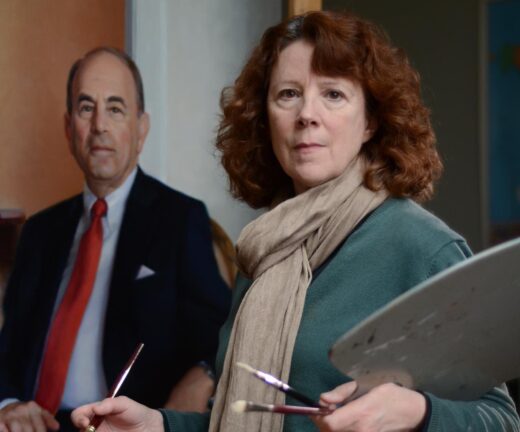This story first appeared in PA Local, a weekly newsletter by Spotlight PA taking a fresh, positive look at the incredible people, beautiful places, and delicious food of Pennsylvania. Sign up for free here.
By Colin Deppen | Spotlight PA
Ellen Cooper has spent days preparing to paint former state House speaker Bryan Cutler’s official portrait. Before putting brush to canvas, she toured the Capitol with the Lancaster County Republican, gathering the kinds of visual reference material — posture, countenance, accessories — that goes unnoticed by most.
When finished, the piece will be added to a Harrisburg gallery of faces spanning hundreds of years, something Cutler called “an honor” and “humbling” in a statement to PA Local. It will also join Cooper’s growing catalog, which includes some of Pennsylvania’s most powerful — if not instantly recognizable — people.
Cooper, a Temple University grad from Delaware County, painted the official portrait of former state House speaker Samuel H. Smith and a posthumous portrait, commissioned by former First Lady Susan Corbett, of Pennsylvania’s first and so far only female governor, Hannah Penn. She’s also painted judges, CEOs, doctors, university leaders, and a former governor of Massachusetts.
Cooper spoke with PA Local about finding faces in the crowd, immortalizing her muses, and why she thinks painted portraits persist in an age of Instagram and livestreams.
The conversation has been edited for clarity, flow, and length.
What’s the hardest part of a person to paint?
Hands are challenging, but they’re not the hardest part. I guess that would be finessing facial features and the sense of light on those features because little differences are noticeable to people. We’re all experts on the human face.
Where do you start?
Everybody looks different from each other, of course, and it all boils down to shapes, sizes, and proportions. It’s rather abstract. I’m looking at what the light is doing on the form, which is very specific to each situation and person. That’s sort of the mechanical part.
But the other part for me, what I love doing, is getting to know the people I paint. I do research about them. I interview them. Decisions get made about what happens in the portrait based on my understanding of them.
Has anyone ever been taken aback by their likeness?
I haven’t had that experience, in part because I guess I have a process of working with people, right?
All of the big decisions happen largely in collaboration. I don’t like surprises. I also do a paint study of the proposed portrait that I present to them so that they can respond. [Editor’s note: Think of a paint study as a first draft.]
Can you turn this off or do you walk into a grocery store and just see bone structure everywhere you turn?
I think I can tune it up and tune it down a bit. I mean, the world is very alive to me and very, very interesting everywhere. I will say I’m constantly looking at the light, and how the light reveals whatever it is. So even in a grocery store, people are being revealed in grocery store
lighting. And the individuals are just always so interesting to me — what they look like, how they age. I think people are just wonderful and fascinating.
How long does a commissioned portrait take?
Typically over a month.
What led you to painting portraits?
My mother painted portraits when I was growing up. It happened around me. I would see people come to my mother’s studio and they’d leave with a portrait. I remember sitting for a portrait by her when I was six years old. I still have that painting.
By the time I was in high school, it was clear to me that I wanted to go to art school, and I did, and it was the portraits that interested me the most.
Are powerful people harder to paint?
There are time constraints. The bar is high. When some people buy a portrait it’s part of a continuum, some dating back to the 1800s or earlier. So there’s a lot riding on it.
Have you ever refused a commission?
It’s kind of a tough question. I would say that I haven’t been in a position to refuse a commission for a personal reason.
How far along is Cutler’s portrait?
I’m soon to start. I’ve done the initial things, which would be the interview and then working with him doing a paint study and doing a photographic session and the preliminary sketch.
Can you tell me about the portrait of Hannah Penn, who died centuries earlier?
It was interesting because there’s very little visual information about her. But I made it my business to find out what I could and track down any visual representation I could.
And so I painted it, but there was an issue with the Capitol preservationists not liking the placement and it was taken to the state museum.
It could be down in the basement there. I have no idea.
[Editor’s note: The Wolf administration told PennLive in 2015 that the painting was moved to the ornate Governor’s Reception Room but ultimately placed in storage due to safety concerns. The portrait is now on display in the State Museum’s icon exhibit.]
Why do you think portrait painting persists in popularity in an age of such ubiquitous photography?
Perhaps just because it doesn’t come from something mechanical. Paintings are still paintings.
I had a great experience walking around a hospital with a doctor — who was commissioning me to paint another doctor — to view their historic portrait collection. We came upon a hall where one department had decided to do photographic portraits [of high-ranking staff], like headshots, and it was such a letdown.
Maybe it’s me, but I look at paintings of people I’ve never met and never will meet, and I’m fascinated by them. Maybe it’s the filter of the artist and their hand. It’s like, everybody’s signature is different, right? You feel that filter of the artist. Their presence is there.
The presence of the subject is there too! The artist has captured that person, or some aspect of them, in the light, and the statement is profound and alive.
BEFORE YOU GO… If you learned something from this article, pay it forward and contribute to Spotlight PA at spotlightpa.org/donate. Spotlight PA is funded by foundations and readers like you who are committed to accountability journalism that gets results.









